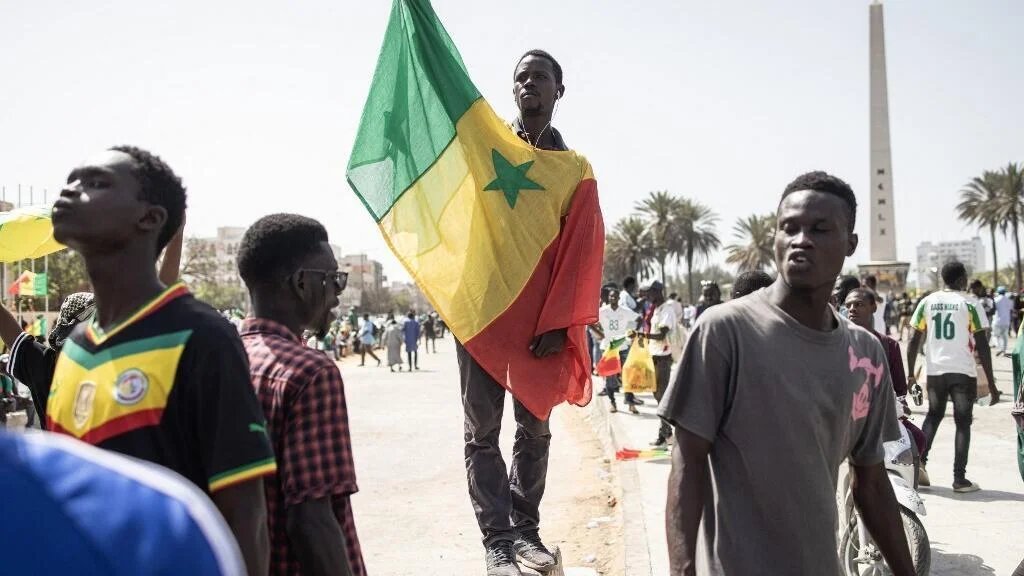In the lead-up to Senegal’s February 2024 presidential election, government actions against opposition figures, journalists, and civil liberties have raised alarms about democratic backsliding. Jeffrey Conroy-Krutz, a professor specializing in African politics at Michigan State University, noted to RFI that repression “seems to have escalated in the past few weeks, and even more in the past few days.” The arrest of opposition leader Ousmane Sonko, charged with fomenting insurrection, and journalist Pape Alé Niang for commenting on Sonko’s detention, alongside internet shutdowns and protest bans, signal a troubling trend for one of West Africa’s most stable democracies.
Ousmane Sonko and Pastef’s Dissolution
Ousmane Sonko, a prominent opposition figure and leader of the Patriotes Africains du Sénégal pour le Travail, l’Éthique et la Fraternité (Pastef), was convicted in June 2023 of “corrupting youth,” sentenced to two years, and later charged with insurrection, rendering him ineligible for the 2024 election, per Senegal’s Justice Minister Ismaila Madior Fall. The dissolution of Pastef in July 2023, an unprecedented move in Senegal, sparked widespread unrest. “That’s never happened before in Senegal,” Conroy-Krutz told RFI, calling it the most worrying development. Human Rights Watch urged authorities to reverse the dissolution and respect protest rights, citing violations of free expression and assembly.
Media and Internet Restrictions
Senegal’s government intensified media crackdowns, with Amnesty International calling for the release of journalist Pape Alé Niang, arrested for “spreading fake news” after reporting on Sonko’s case. Niang was granted temporary bail on August 8, 2023. In June, authorities blocked platforms like Facebook, WhatsApp, Instagram, Telegram, and YouTube, later extending disruptions to mobile internet and television stations, including a month-long suspension of Walf TV. “Senegal’s internet shutdowns are another sign of a democracy in peril,” Conroy-Krutz warned, noting their severity even after President Macky Sall ruled out a third term. These measures, coupled with attacks on journalists, have drawn condemnation from Amnesty and HRW for undermining press freedom.
Arrest and Deportation of Juan Branco
Sonko’s Franco-Spanish lawyer, Juan Branco, was arrested near the Mauritania border on August 5, 2023, charged with conspiracy and spreading fake news, and deported to France on August 7. Branco’s team called the arrest “politically motivated” and an act of “political muzzling,” appealing to the UN. At a Paris press conference, Branco described “ferocious, massive repression” in Senegal, claiming he witnessed tortured detainees. Justice Minister Fall indicated Branco could still face prosecution in France. The case, alongside the arrest of another Sonko lawyer, Babacar Ndiaye, highlights concerns over judicial independence.
Implications for Senegal’s Democracy
The violent suppression of Sonko’s supporters, with at least 29 deaths and 500 arrests during June 2023 protests, underscores the crisis. “The arrests and violent put-down of protests are evidence of a serious escalation,” Conroy-Krutz said, emphasizing the opposition’s challenge to unite against Sall’s ruling coalition. Despite Sall’s decision not to seek a third term, the crackdowns, including reported use of live ammunition and arbitrary detentions, threaten Senegal’s democratic credentials. As the 2024 election approaches, the opposition’s ability to form a cohesive front and international pressure for free elections will be critical in restoring civic space






